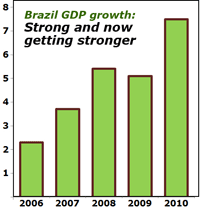Results 1 to 1 of 1
Thread Information
Users Browsing this Thread
There are currently 1 users browsing this thread. (0 members and 1 guests)
-
12-20-2010, 11:42 PM #1Senior Member


- Join Date
- May 2007
- Location
- South West Florida (Behind friendly lines but still in Occupied Territory)
- Posts
- 117,696
Brazil From Debt Pariah to Cash King, The New Miracle Econom
Brazil From Debt Pariah to Cash King, The New Miracle Economy
Economics / Brazil
Dec 20, 2010 - 08:16 AM
By: Martin_D_Weiss
Brazil’s economy is booming, and I can assure you, it’s not a bubble.
I am also certain that the vast riches being made are not a flash in the pan.
Let me tell you why I’m so confident.
First, because my family and I are in Brazil right now and I can see it with my own eyes.
This past Saturday night, for example, my brother’s grandson graduated from middle school; and we attended the ceremony in São Paulo, Brazil’s biggest city.
The prosperity and optimism in the hall was so tangible, I could practically touch it.
Friday, at a very different kind of ceremony on our farm, the sentiment was identical; and we see the same pattern in every city and ever region.
Second, I’m confident because of the robust construction activity all around us, the new superhighways in development and even some of the old roads — finally without potholes.
And third, I know because of the numbers:

In the four quarters ending September 31, Brazil’s economy grew 7.5 percent compared to the prior four-quarter period. And if you measure growth from January of this year, the numbers look even better: GDP is up a whopping 8.4 percent compared to the first three quarters of 2009.
Looking ahead, conservative estimates of Brazil’s growth in 2011 exceed 7 percent. If they’re wrong, it could be even better.
Meanwhile …
* Brazil’s budget deficit is only 3 percent of GDP, compared to over 10 percent in the U.S.
* Brazil’s foreign debt is close to zero, compared to the largest foreign debts of all time owed by the U.S.
* And Brazil’s government debt burden (owed almost entirely to domestic creditors) is expected to shrink to about 30 percent of GDP in the years ahead. In contrast, the Obama administration’s Office of Management and Budget projects that the U.S. debt burden will surge past 100 percent of GDP by 2013. But worse, with the new law signed by the president on Friday, we could cross that dangerous threshold as soon as next year.
What about 2008 when the U.S. — plus most of the world — was shaken by the worst financial crisis since the Great Depression? Brazil’s economy still grew 5.4 percent in that year.
In retrospect, all this is now very obvious and widely recognized by Brazil specialists.
But it wasn’t always that way …
From Debt Pariah to Cash King
They said I was crazy.
The time was early January 2003. Elisabeth and I had just returned to the U.S. from our yearly trip here — a few days after the new president, Luiz Inácio Lula da Silva, was sworn into office in Brasilia.
At the time, every financial analyst I spoke to or heard of was saying Lula would trash Brazil’s finances, gut Brazil’s federal budget, deliberately default on Brazil’s foreign debts, and kill Brazil’s currency. They insisted the country would soon become a debt pariah, shunned by the global investment community.
I said precisely the opposite. I told anyone who cared to listen that Lula would tolerate no such nonsense. If anything, he would pay down the country’s debts, strengthen its currency, and make Brazil a king of cash.
That’s why they said I was crazy.
What they didn’t know was Lula as a person. But I did — through my brother, Joe Weiss, and through Joe’s wife, one of a handful of founding members of Lula’s party.
Indeed, during some of his first political campaigns, when Lula traveled to Brasilia, he used to stay at Joe’s home. Later, when Joe moved his family to New Jersey, Lula’s son lived with them as an exchange student.
I didn’t meet Lula personally until 1993 when he came to New York City. Dad made the introductions so that Lula could give a major policy speech at Bear Stearns. Meanwhile, Joe, his wife, and I escorted Lula to the event and to interviews with the editors of The New York Times and other major media.
After Lula returned to Brazil, Dad and I talked frequently about the country’s prospects under a future Lula administration; and from the outset, one thing was very clear: Despite his leftist roots, Lula was a die-hard fiscal conservative who would toe a tough line on virtually everything related to money.
“I don’t agree with his politics,�Join our efforts to Secure America's Borders and End Illegal Immigration by Joining ALIPAC's E-Mail Alerts network (CLICK HERE)


 LinkBack URL
LinkBack URL About LinkBacks
About LinkBacks




 Reply With Quote
Reply With Quote

Tenth List of Content Moved to Archive "Americans Killed by...
04-30-2024, 06:46 PM in Americans Killed By illegal immigrants / illegals